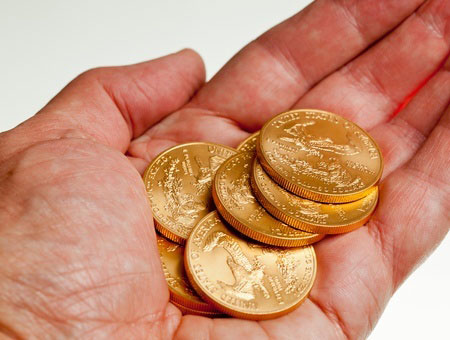This is an important question, and you should be aware of the costs involved before you take out your calculator and figure out the selling price of the gold coins you own.
First, let’s be clear that we are talking about gold bullion coins here. Pure gold. What follows does not apply to collectible gold coins.
Step one is to check the spot price of gold for the day.
The spot gold price refers to the price of gold for immediate delivery. In other words, if you walk into a bullion dealer off the street and take out your wallet, the spot gold price is close to what you’ll pay for a gold coin or bar. (Plus the premium the dealer is going to charge you.)
Find out more about the spot price of gold here.
When buying and selling pure gold coins you need to be aware of the bid/ask spread. In simple terms, that means the difference in price you will pay between selling gold and buying gold.
Most gold dealers quote two prices: a bid price and an ask price. The “bid” is the lower of the two and is the price the dealer will buy metal back from you. The “ask”, sometimes called the “offer”, is the price the dealer will sell metal to you.
The difference between these two gold prices is the bid/ask “spread”.
The spread often comes as a shock to people owning and selling gold for the first time. And you should be aware that this spread can vary widely between different dealers. So you should always shop around before deciding on the dealer you want to work with.
How much is the bid/ask spread? It does vary, but don’t be surprised by a spread of about 4%.
The selling price of gold coins is also impacted by other elements, including commissions, handling and other fees.
The cost of selling your gold is something you should keep in mind at all times. If you are buying gold to own and keep as a physical asset in your home or in safe storage, you will only have to deal with the losses incurred by selling on those rare occasions when you decide to sell one or more of your gold coins.
If you plan to buy and sell on a more regular basis, then the bid/ask spread can quickly bite into any profits you make by trading your gold.
How to avoid losing on the bid/ask spread.
This is why many people who do plan to buy and sell on a regular basis often prefer to hold their gold not as physical coins, stored at home, but in allocated storage with a bullion dealer. You still own the gold, but you don’t take delivery.
One advantage to buying gold in allocated storage is that the bid/ask spread is considerably lower. As an example, BullionVault advertises a spread of about 0.4%, which is one tenth of the spread you might pay when buying and selling physical gold coins.



